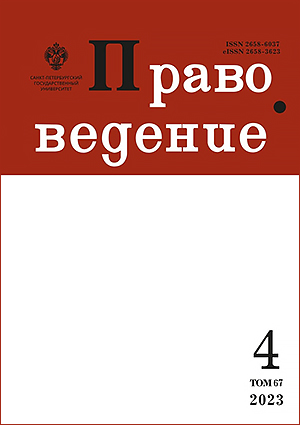Problems of the constitutional regulation of Internet platforms in United States of America
DOI:
https://doi.org/10.21638/spbu25.2023.401Abstract
In this article, the author explores how a specific understanding of freedom of speech, press, opinion, public-private culture in the United States legal system has played a paradoxically negative role in the development of the Internet platforms from the point of protecting user rights. The question is why big Internet platforms set rules for users in a way that is not in line with the law of the jurisdictions in which they operate, and what role in this is played by the legal interpretation of the First Amendment to the US Constitution, regulations governing the Internet platform in this country. The author is using the comparative-legal method, the method of analysis, the historical-legal method to investigate constitutional guarantees of freedom of speech, which were historically developed in the United States and concludes that due to the specificity of the current legal regulation these guarantees do not actually apply to Internet platforms, which in turn have moved from restricting spam and pornography to mass scale political censorship.
Keywords:
USA, freedom of speech, Internet platforms, cyberlaw, censorship, digital rights, social media, constitutional law
Downloads
References
Anderson, Monica. 2021. Americans divided on whether Trump should be permanently banned from social media. Pew Research Center. Available at: https://www.pewresearch.org/facttank/2021/05/05/americans-divided-on-whether-trump-should-be-permanently-bannedfrom-social-media/ (accessed: 20.08.2022).
Cohen-Almagor, Raphael. 2013. Internet responsibility, geographic boundaries, and business ethics. Chapter: Cyberspace Law. Censorship and regulation of the Internet. Ed. by H. Travis. New York, Routledge: 85–105.
Fernandez, Peter. 2022. “Through the looking glass: envisioning new library technologies” changing the legal foundation of the internet: Section 230. Library Hi Tech News 33, 5: 5–8.
Horton, Monica. 2016. Freedom of Expression, Human Rights Standards, and Private Online Censorship. Cybersecurity and Human Rights in the age of Cyberveiliance. Ed. by J. Kulesza, R. Balleste. London. Rowman, Littlefield Publishers: 85–105.
Lessig, Lawrence. 1999. Code and Other Laws of Cyberspace. New York, Basic Books, London, Rowman & Littlefield Publishers.
Oremus, Will. 2022. Tech giants banned Trump. But did they censor him? Washington Post. January 7. Available at: https://www.washingtonpost.com/technology/2022/01/07/trump-facebook-ban-censorship/ (accessed: 20.08.2022).
Reed, Chris. 2012. Making Laws for Cyberspace. Oxford, Oxford University Press.
Savel’ev, Alexandr I. 2014. Elektronnaia kommertsiia v Rossii i za rubezhom: pravovoe regulirovanie. Available at: https://www.consultant.ru/cons/cgi/online.cgi?req=doc&base=CMB&n=17671 (accessed: 09.12.2022). (In Russian)
Turley, Jonathan. 2022. Censorship by surrogate: Why Musk’s document dump could be a game changer. The Hill. March 12. Available at: https://thehill.com/opinion/judiciary/3760753-censorship-by-surrogate-why-musks-document-dump-could-be-a-game-changer/ (accessed: 11.12.2022).
Vogels, Emily A., Perrin, Andrew, Anderson, Monica. 2020. Most Americans Think Social Media Sites Censor Political Viewpoints. Pew Research Center. Available at: https://www.pewresearch.org/internet/2020/08/19/most-americans-think-social-media-sites-censor-political-viewpoints/(accessed: 20.08.2022).
Downloads
Published
How to Cite
Issue
Section
License
Articles of "Pravovedenie" are open access distributed under the terms of the License Agreement with Saint Petersburg State University, which permits to the authors unrestricted distribution and self-archiving free of charge.




